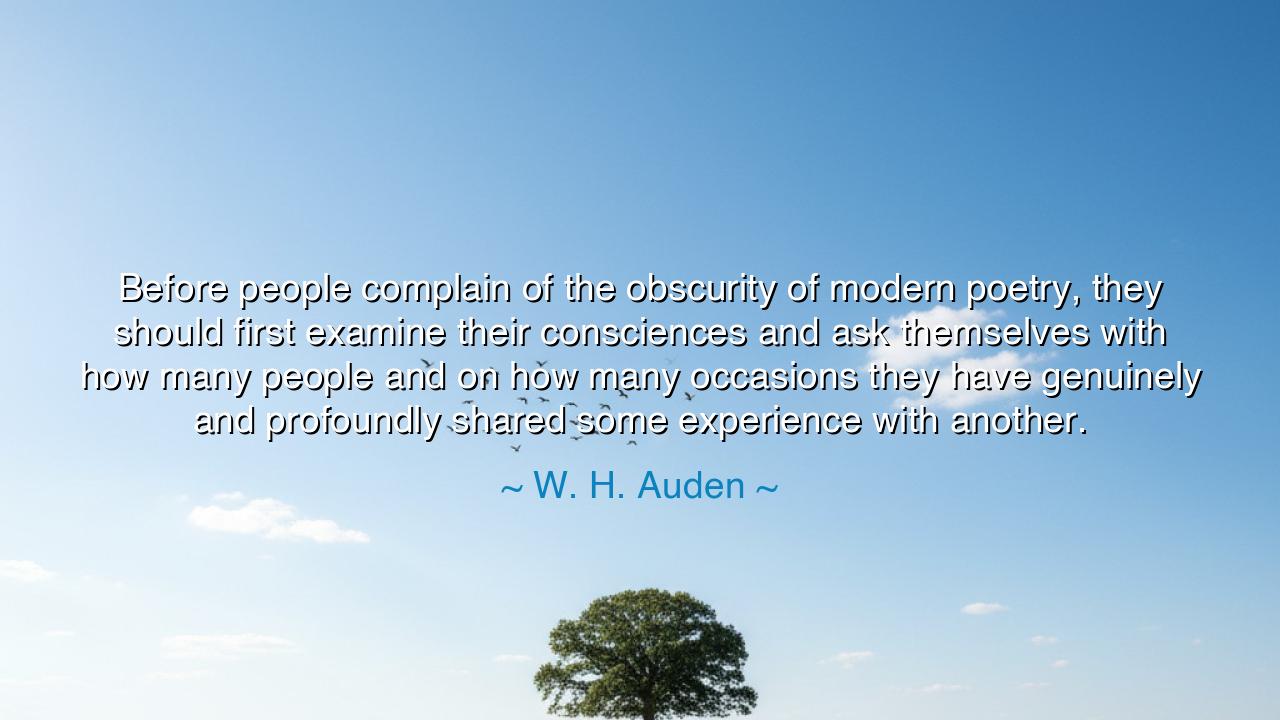
Before people complain of the obscurity of modern poetry, they
Before people complain of the obscurity of modern poetry, they should first examine their consciences and ask themselves with how many people and on how many occasions they have genuinely and profoundly shared some experience with another.






Hear, O seekers of wisdom, the voice of W. H. Auden, who declared: “Before people complain of the obscurity of modern poetry, they should first examine their consciences and ask themselves with how many people and on how many occasions they have genuinely and profoundly shared some experience with another.” In this saying, Auden unveils a truth both piercing and uncomfortable: that the difficulty we find in poetry often mirrors the difficulty we find in life itself. To truly understand a poem, one must first have learned the art of deep sharing, of authentic communion with others.
For the charge of obscurity is often hurled at modern poets, whose verses may seem fractured, strange, or resistant to easy meaning. Yet Auden reminds us that life itself is fractured, strange, and resistant. The poem does not hide truth from us; it reflects the complexity we refuse to face. If the reader has never dared to enter into profound experience with another soul—has never risked vulnerability, sorrow, or wonder—how can they expect to enter into the same depths when offered by the poet? The fault, he says, lies not only in the poet’s craft but in the reader’s capacity for openness.
Consider the life of T. S. Eliot, whose The Waste Land baffled many with its broken images and obscure allusions. Readers complained that the poem was incomprehensible. Yet those who had lived through the First World War, who had seen civilization shatter and hope bleed into the mud, found in it a mirror of their own souls. To them, its obscurity was not darkness but truth. The poem required not only intelligence but empathy, not only knowledge but shared human experience. Only those who had felt the fractures of their own lives could understand the fractures of Eliot’s verse.
Auden’s words also strike at the heart of our human failing: we speak much, but we share little. We pass each other daily, but rarely do we pause to enter the depths of one another’s souls. We shield ourselves from intimacy, we hide behind surfaces, we fear the vulnerability of true communion. And then, when confronted with poetry that demands such intimacy, we retreat, calling it obscure. The obscurity lies not in the lines but in the walls around our hearts.
History offers us countless examples of this truth. When Anne Frank’s diary was first read, some dismissed it as the simple record of a young girl. Yet those who entered deeply into her words, who shared her fear, her longing, and her fragile hope, discovered not obscurity but clarity, not confusion but profound truth. So it is with poetry: only by opening ourselves to the reality of another’s experience can we move past the surface and into the soul of the work.
Thus, the lesson is clear: before judging art, examine the conscience. Ask yourself: when have I truly shared joy, grief, or wonder with another? How often have I dared to listen with my whole being, to see with another’s eyes, to feel with another’s heart? If the answer is rarely, then the obscurity of poetry is no mystery—it is the echo of our own isolation. But if we learn to share, to connect deeply, then even the most complex verses will open like flowers in our hands.
Therefore, O children of tomorrow, do not shrink from the challenge of modern poetry. Instead, expand the capacity of your soul to share in the lives of others. Enter conversations with courage, cultivate empathy, and seek communion with those around you. For the more you share in life, the more you will recognize yourself in poetry. And in doing so, you will discover that what once seemed obscure is, in truth, the deepest clarity of all. For poetry is not a puzzle to be solved, but a soul to be shared.






7L7/4 Liem
This quote turns the criticism of modern poetry back onto society itself. Auden implies that understanding art depends on one’s capacity for human connection. That’s a powerful idea—perhaps poetry mirrors our ability to empathize. I’m curious whether he meant this as a critique of modern life’s isolation or simply as a timeless truth about how feeling and understanding are intertwined.
KLNguyen Thi Kim Lien
Auden’s statement feels like a defense of modern poets who are often accused of being too abstract. Maybe the issue isn’t their complexity but our disconnection. We live in an age of surface-level interactions, so when a poem demands emotional intimacy, it feels foreign. I wonder—if people learned to listen and share more deeply, would poetry suddenly seem clearer?
ATBui thi anh tuyet
I find Auden’s observation both humbling and provocative. He’s essentially saying that the fault lies not in the poets but in us as readers. If we haven’t truly connected with others, how can we expect to connect with art that tries to express such connections? It makes me question how often we read poetry with emotional honesty rather than intellectual distance.
NDVo Nguyen Dinh
This quote really challenges readers to take responsibility for their own emotional depth. Auden seems to suggest that understanding poetry requires empathy and genuine human connection. Maybe modern poetry feels obscure not because it’s too complicated, but because many readers have lost the habit of deep feeling. It makes me wonder—can one truly appreciate art without first learning to share and experience life authentically?